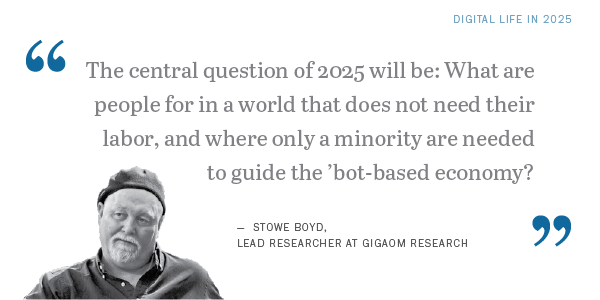
As part of our series of reports marking the 25th anniversary of the World Wide Web, we canvassed a range of experts to assess what impact robotic advances and the use of Artificial Intelligence [AI] will have on society—and on human employment in particular—by 2025. Nearly 1,900 expressed their views on two questions: 1.) “To what degree will AI and robotics be parts of the ordinary landscape of the general population by 2025? Describe which parts of life will change the most as these tools advance and which parts of life will remain relatively unchanged.” 2.) “Will networked, automated, artificial intelligence (AI) applications and robotic devices have displaced more jobs than they have created by 2025?” Here are some of the major points they made.
Overview
- Experts say automation and intelligent digital agents will permeate vast areas of our work/personal lives by 2025
- 52% of experts say tech advances will NOT displace more jobs than they create by 2025; 48% say they will
- Many experts fear that the workforce is not being adequately prepared for tech changes on the horizon
- Experts see tech changes resulting in new skills being valued, and a rethinking of the concept of work
- Technological advances will change the industrial age notions of what a “job” is, experts say
- “When the car was introduced, buggy whip makers went out of business. It will ever be so.”—Penn State professor
How fast is change coming?
- Many experts see advances in AI and robotics pervading nearly every aspect of daily life by 2025
- “The penetration of AI and robotics will be close to 100% in many areas”— Marc Prensky
- By 2025 “All the fundamentals of life can and will be automated, from driving to grocery shopping”—@nilofer
- “Self-driving cars seem very likely by 2025”—@vgcerf
- Robots/AI will start to become “background noise” in peoples’ daily lives—@cascio
- “The degree of integration of AI into daily life will depend very much, as it does now, on wealth”—Bill Woodcock
- “We’re still a very long way from ‘AI’ as generally seen in the movies, i.e. humanoid robots”—@sethfinkelstein
- “Automated cars will not make it into use—this is way harder than anybody is letting on”—a business professor
Reasons for optimism about the impact of technological change
- Experts say tech advances will displace certain types of work, but historically they’ve been net creator of jobs
- “Historically, technology has created more jobs than it destroys”—@vgcerf
- “Every wave of automation and computerization has increased productivity w/o depressing employment”—@MichaelKende
- A new wave of innovations and jobs will be created from the need to code/build new high tech tools—@MichaelKende
- .@markoff wonders, who would’ve thought SEO would be a significant job category 15 years ago?
- By 2025, “there is likely to be more human-robot collaboration,” says @MarjorySB
- “For all the automation and AI, the ‘human hand’ will have to be involved on a large scale”—David Hughes
- “An app can dial Mom’s number and even send flowers” but it can’t emotionally connect with her—@mediapsychology

Concerns about the impact of high-tech advances
- Experts’ concern about tech advances: Automation has hit blue collar employment; white collar jobs will be next
- “Automation is Voldemort: the terrifying force nobody is willing to name”—@jerrymichalski
- Tech advances and jobs—“There is great pain down the road for everyone as new realities are addressed”—Mike Roberts
- “Everything that can be automated will be automated.”—@cybertelecom
- “Robots and AI threaten to make even some kinds of skilled work obsolete (e.g., legal clerks)”—@tomstandage
- Tech will create new jobs, but there’ll be “losses in middle and gains of terrible jobs at the bottom”—@bjfr
- Vytautas Butrimas expects social unrest between 2020 and 2025 because of jobs displaced by technology
- “Skills needed to manage the AI will be highly specialized and out of the reach of 95% of people”—software engineer
The challenge of being ready for change
- .@geoffliving on the impact of AI/Robotics: “The technology may be ready, but we are not—at least, not yet.”
- “Only the best-educated humans will compete with machines” in the workplace—@hrheingold
- .@BryanAlexander thinks the education system is not well positioned to shape grads to “race against the machines”
- .@halvarian sees a future w/ fewer jobs due to tech advances but more equitable distribution of labor/leisure time
Challenges for policymakers
- Experts say without policy shift, automation threatens to increase both unemployment and income inequality
- “Just because there’s a technology that exists to replace jobs doesn’t mean it has to be adopted”—Ben Fuller
- Decisions about using tech surrogates will be driven by culture/politics as much as practicality—@jonl


